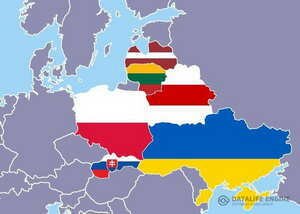
Oleksiy Volovych
The trade route “from the Varangians to the Greeks” has been relevant since the times of Kievan Rus. The idea and the project of the Baltic-Black Sea alliance of Eastern European states, is being developed by Ukrainian, Polish and Lithuanian geo-political scientists for over 100 years. All the countries located on the Baltic-Black Sea axis are Christian ones and their nations have long European cultural traditions. They are Sweden, Finland, Lithuania, Latvia, Estonia, Poland, Ukraine, Belarus (which is building a “union state” with Russia), the Czech Republic, Slovakia, Hungary, Moldova, Romania, Bulgaria and Georgia. If these countries were joined by two Muslim countries — Azerbaijan and Turkey — the possible union of these states would be self-sufficient and powerful because their overall GDP would twice exceed Russia's GDP.
Historical Background
At the end of the 19th — beginning of the 20th century, Ukrainian political and public figures Yulian Bachynskyi (1895), Mykola Mikhnovskyi (1900) and Stepan Rudnytskyi (1923) made the first attempt to develop a Baltic-Black Sea geopolitical concept. In the times of the UPR, an outstanding Ukrainian historian and Head of the Tsentralna Rada (Central Council) M. Hrushevskyi introduced the idea of creation of the Baltic-Black Sea Alliance in his work “The Black Sea Conception” (1918). The public figure, writer, publicist and ideologist of Ukrainian nationalism, Yuriy Lypa created the geopolitical “The Black Sea Doctrine” (1940), which pointed to the historical community of peoples inhabiting the shores of the Baltic and Black Seas. Yu. Lypa was in favour of creation of the Baltic-Black Sea Federation consisting of Ukraine, Poland, Lithuania and Belarus.
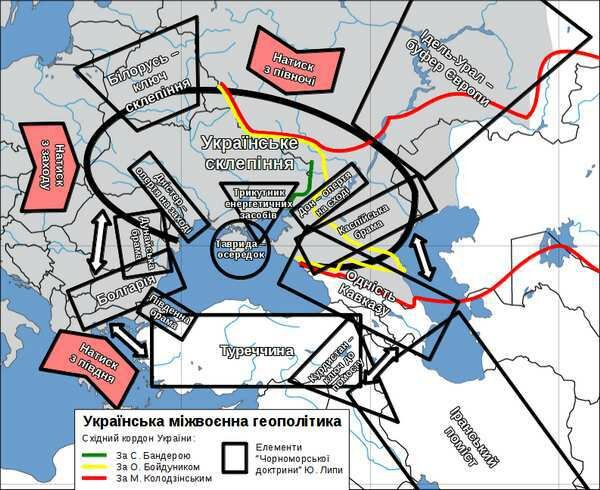
For the first time the Baltic-Black Sea Union (BBSU) was established at a conference in Riga in August 1919. The document was signed by the delegations of Poland, Ukraine, Finland, Estonia, Latvia and Lithuania. The BBSU's program, developed by the Foreign Minister of Latvia Zigfrīds Meierovics, contained plans for a defensive alliance, integration of economic systems, common banking and monetary system, political convention on mutual support and common foreign policy, securing the free route from the Baltic to the Black Sea. Nevertheless, for a variety of reasons this project did not come true.
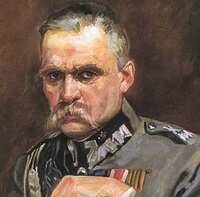 A significant contribution to the development of the project of the BBSU was made by Polish politicians and officials. Thus, in 1920s, the Polish Marshal Jozef Pilsudski put forward the idea of Confederation consisting of Poland, Lithuania, Belarus and Ukraine, which had to revive the multinational Rzeczpospolita as a counter-balance to Germany and Russia's domination in Eastern Europe. The USSR and all the Western states, except France, were at that time against that idea.
A significant contribution to the development of the project of the BBSU was made by Polish politicians and officials. Thus, in 1920s, the Polish Marshal Jozef Pilsudski put forward the idea of Confederation consisting of Poland, Lithuania, Belarus and Ukraine, which had to revive the multinational Rzeczpospolita as a counter-balance to Germany and Russia's domination in Eastern Europe. The USSR and all the Western states, except France, were at that time against that idea.
Among those involved in developing the project of the BBSU were Foreign Minister Josef Beck, General Wladyslaw Sikorski, the leader of the right-wing nationalist party — Confederation of Independent Poland Leszek Moczulski and others.
It should also be mentioned that for the first time a new concept of relations between Ukrainians, Lithuanians and Belarusians was formulated by the outstanding Polish philosopher Juliusz Mieroszewski who explained the need for liberation from Russia of Ukraine, Lithuania and Belarus. This concept is called the Giedroyc-Mieroszewski Doctrine and is the basis of Poland's modern Eastern European diplomacy.
The concept of Intermarum is consonant to the “NATO-Bis” idea launched in the early 1990s by the former Polish President Lech Walesa. In March 1993, Tomasz Szczapanski's book “Intermarum” was published in Poland, in which the author presents the geopolitical characteristics of the region, gives different options for forming the Baltic-Black Sea Union and forecasts its possible relations with Russia, Western Europe and Scandinavia.
For the first time since the collapse of the USSR, the initiative to intensify the Baltic-Black Sea cooperation on the state level was voiced by the then President of Lithuania A. Brazauskas at the 2006 Summit in Vilnius. From 2 to 5 May 2006 in Vilnius, there was the “Common Vision for Common Neighborhood” International Conference, devoted to the problems of the Baltic-Black Sea cooperation. As pointed out by the first Prime Minister of the Republic of Lithuania after the restoration of independence Casimir Prunskienė: “I have not lost hope that the Baltic-Black Sea alliance is not only our historical past from the time of the Grand Duchy of Lithuania. Certain historical motivations have remained until now.”
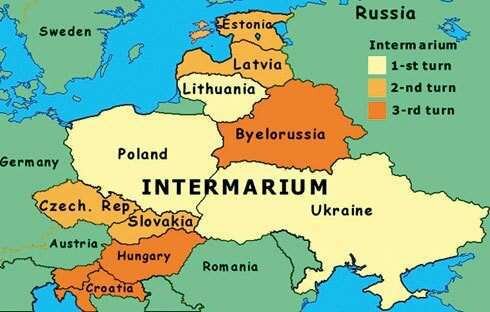
In 1992, the Belarusian Popular Front (Zenon Pozniak) put forward the idea of creating a Baltic-Black Sea Union as a buffer international formation without NATO and Russia's military bases. Moscow, however, headed off the creation of the BBSU by supporting A. Lukashenko's puppet regime, and the destruction of the Belarusian sovereignty under the guise of the so-called Union StateofRussiaandBelarus, which has already being built for more than 20 years. In 2010, the project “New Rzeczpospolita” appeared in Belarus. Its aim is creation of “People's Republic” consisting of Poland, Belarus, Lithuania, Latvia and Ukraine.
 In February 1993, in Budapest, President L. Kravchuk put forward the initiative to establish a zone of stability and security in Central and Eastern Europe. It was assumed that it had to include the Baltic States, Ukraine, Belarus, Poland, Czech Republic, Slovakia, Hungary, Austria, Bulgaria and Romania. In April 1993, Kyiv prepared the project of creation of the Central and East European Space of Stability and Security (CEESSS), which had to work under the slogan “Security for one — through security for all”.
In February 1993, in Budapest, President L. Kravchuk put forward the initiative to establish a zone of stability and security in Central and Eastern Europe. It was assumed that it had to include the Baltic States, Ukraine, Belarus, Poland, Czech Republic, Slovakia, Hungary, Austria, Bulgaria and Romania. In April 1993, Kyiv prepared the project of creation of the Central and East European Space of Stability and Security (CEESSS), which had to work under the slogan “Security for one — through security for all”.
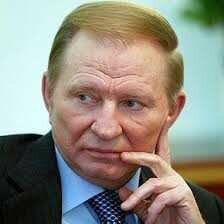 In 1994, in Kyiv there was created the League of parties of Intermarium countries, which was to generate the idea of the Baltic-Black Sea alliance as the stability and security zone. September 10-11, 1999, in Yalta, there was a Summit “Baltic-Black Sea Co-operation: to the Integrated Europe in the Twenty-First Century without Dividing Lines”, where they discussed issues of strengthening multilateral cooperation in the area between the two seas. Speaking at the summit, President L. Kuchma said, “Baltic-Black Sea axis can and should be one of consolidating and stabilizing rods of the new Europe and, therefore, an integral part of it”. However, formalization and institutionalization of the Baltic-Black Sea cooperation did not happen during the Summit in Yalta.
In 1994, in Kyiv there was created the League of parties of Intermarium countries, which was to generate the idea of the Baltic-Black Sea alliance as the stability and security zone. September 10-11, 1999, in Yalta, there was a Summit “Baltic-Black Sea Co-operation: to the Integrated Europe in the Twenty-First Century without Dividing Lines”, where they discussed issues of strengthening multilateral cooperation in the area between the two seas. Speaking at the summit, President L. Kuchma said, “Baltic-Black Sea axis can and should be one of consolidating and stabilizing rods of the new Europe and, therefore, an integral part of it”. However, formalization and institutionalization of the Baltic-Black Sea cooperation did not happen during the Summit in Yalta.
Partially the BBSU principles have been implemented in the political, institutional and economic dimensions through the creation of the Visegrad Group (1991), GUUAM (1997) and the Community of Democratic Choice (2005).
Today's Need for Implementation of the BBSU Project
 In 2015, the idea of the Baltic-Black Sea alliance gained new significance after the newly elected President of Poland Andrzej Duda had repeatedly stated that he intended to invite the heads of Central and Eastern European countries to create a “partnership alliance of states” from the Baltic to the Black and Adriatic Seas. On the eve of his inauguration, August 6, 2015, A. Duda called for creation of the Baltic-Black Sea alliance of states consisting of Poland, Ukraine, Belarus, Latvia, Lithuania, Estonia, Moldova, Hungary, Romania, Bulgaria, Slovakia, the Czech Republic and the six countries of the former Yugoslavia. At this, A. Duda expressed willingness to discuss this idea by holding meetings with the heads of states of Central and Eastern Europe. Actually, Andrzej Duda continued the work begun by Polish President Lech Kaczynski, who shortly before his death in a plane crash near Smolensk, had offered to host an international conference on “Intermarum”, based on the changes in Ukraine, which occurred after the 2004 Orange Revolution.
In 2015, the idea of the Baltic-Black Sea alliance gained new significance after the newly elected President of Poland Andrzej Duda had repeatedly stated that he intended to invite the heads of Central and Eastern European countries to create a “partnership alliance of states” from the Baltic to the Black and Adriatic Seas. On the eve of his inauguration, August 6, 2015, A. Duda called for creation of the Baltic-Black Sea alliance of states consisting of Poland, Ukraine, Belarus, Latvia, Lithuania, Estonia, Moldova, Hungary, Romania, Bulgaria, Slovakia, the Czech Republic and the six countries of the former Yugoslavia. At this, A. Duda expressed willingness to discuss this idea by holding meetings with the heads of states of Central and Eastern Europe. Actually, Andrzej Duda continued the work begun by Polish President Lech Kaczynski, who shortly before his death in a plane crash near Smolensk, had offered to host an international conference on “Intermarum”, based on the changes in Ukraine, which occurred after the 2004 Orange Revolution.
I think there are two important things about this A. Duda's initiative. It is important that for the first time in the history of Europe, the initiative to create the Baltic-Black Sea alliance was voiced by the President of the most economically powerful and politically influential country of Eastern Europe, a strategic partner of Ukraine. However, the question arises: why does the President of Poland, which is already a member of the European Union and NATO, propose to create the Baltic-Black Sea alliance?
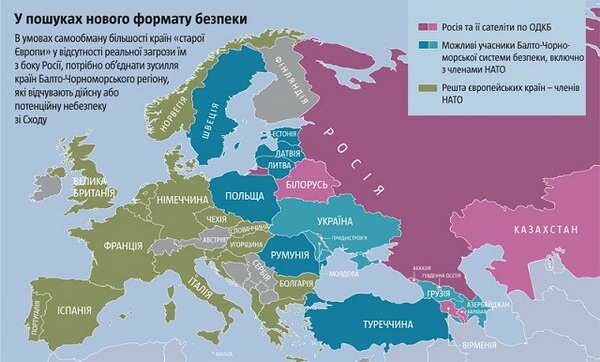
Firstly, as a representative of the right-wing radical Law and Justice Party, A. Duda had to take into consideration that the electorate of this party has certain anti-German and anti-Russian sentiments and in their understanding the idea of the Baltic-Black Sea Union is an alternative to foreign policy strategies of the Russian Federation, Germany and the EU leadership, in which Germany and France play a leading role, and whose European strategy is based on the idea of “non-subjectiveness” of the states of the Baltic-Black Sea region and the possibility of reaching a compromise with Russia at the expense of the interests of countries of the region. Thus, according to the leadership of the Law and Justice Party and its supporters, the results of Normandy Summit in June 2014, as well as the first and second “Minsk Agreements” showed the main features of such a strategy of a “geopolitical compromise” between Berlin, Paris and Moscow at the expense of Ukraine.
Secondly, the idea of the military-political and economic cooperation between the countries of the Baltic-Black Sea region brings to the agenda the issue of their transformation into separate geopolitical entities whose policies may be different not only from Moscow's policy, but also from Berlin, Paris and the EU's policies. In other words, it is about trying to create within the European Union a new Eastern European center of geopolitical influence, which could implement joint political and economic interests. According to some political scientists, such an idea would be well perceived in Washington as a counterbalance to Berlin-Paris tandem against the background of major military, political and economic contradictions between the USA and the European Union, and the growing “Euroscepticism” and “European anti-Americanism”.
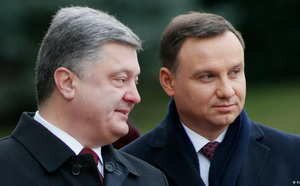 Today, the President of Poland A. Duda is trying to realize a long-standing idea of creating the Baltic-Black Sea Alliance in the situation when Russia's aggression against Ukraine has demonstrated the inadequacy of the current European security system, despite the NATO, the OSCE, the UN and the EU, in the situation where the USA and the UK have not fulfilled their obligations to protect the sovereignty of Ukraine in accordance with the Budapest Memorandum of 1994, and not a single Western European country is going to stop by force Russia's military aggression against Ukraine.
Today, the President of Poland A. Duda is trying to realize a long-standing idea of creating the Baltic-Black Sea Alliance in the situation when Russia's aggression against Ukraine has demonstrated the inadequacy of the current European security system, despite the NATO, the OSCE, the UN and the EU, in the situation where the USA and the UK have not fulfilled their obligations to protect the sovereignty of Ukraine in accordance with the Budapest Memorandum of 1994, and not a single Western European country is going to stop by force Russia's military aggression against Ukraine.
The West's delaying Ukraine's joining the EU and NATO makes Ukraine seek allies to defend its independence and sovereignty from Russia's aggression. These potential allies are, first of all, Poland, Lithuania, Latvia, Estonia, Romania, Moldova and Georgia, which, like Ukraine, have repeatedly been a victim of the imperial politics of tsarist, Soviet and Putin's Russia.
The advantages of creating the Baltic-Black Sea Union include good geostrategic and compact location of Intermarium countries on crossing of transport and energy corridors, complementary economies, long historical contacts and interaction, similarity of ethnic mentality, ideological, cultural and civilizational foundations.
Due to closer political and economic cooperation within the framework of the BBSU, the Eastern European countries could be identified as a completely independent, self-sufficient and organic interstate association with its own interests. This would weaken the struggle between the USA and Russia for influence in Eastern Europe and strengthen the European security. Creation of the BBSU can in no way delay the process of integration of Eastern and Western Europe, but will make this process more stable, organized and harmonic, and will minimize the attempts to “stretch” the Eastern European countries between the West and Russia.
Prospects of Economic Cooperation within the Framework of the BBSU
Today, when experts discuss the project of the Baltic-Black Sea alliance, they, first, discuss the security aspects and motives. In my opinion, the aspect of security alone is not enough for the BBSU project to be complete and viable. Very important is also the economic component of implementation of the BBSU project. Of course, the Baltic and the Black Sea countries are already cooperating in various spheres of the economy at the bilateral level, but if they form the BBSU, they will be able to implement large-scale multilateral economic projects.
In case of creation of the Baltic-Black Sea Union, intensification of its member countries' economic cooperation can be expressed in the simplification of business in a joint economic space, common energy, logistics and infrastructure projects, which will contribute to the economic development of the region. Restoration of transit-transport, economic, energy, financial, trade and social cooperation between the countries of the Baltic-Black Sea region will allow them to increase their economic potential and defence capability.
The positive economic development of the Baltic-Black Sea region can be an example for countries still staying under the influence of Moscow (Belarus and the Central Asian countries). The economic cooperation should be supported by purposeful activities of the member countries of the hypothetical BBSU in the sphere of information, diplomacy and security. Of course, the economic dimension of the project of the Baltic-Black Sea Union can be viable only if it is an integrated part or a sub-region of Great Europe and is supported by the USA.
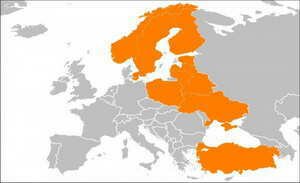 The Baltic-Black Sea region in the coming years can be a wide area of trans-regional cooperation between the countries of Europe, the Caucasus, Central Asia and the Middle East. The efforts of the countries to be included in the BBSU, should be aimed at turning this interstate association into a strong regional structure, filling its activity with real economic content through the formation of a free trade area, implementation of joint transport and energy projects, development of the Euro-Asian transport corridor, cooperation in transporting Caspian, Iranian and Iraqi energy resources to the European market.
The Baltic-Black Sea region in the coming years can be a wide area of trans-regional cooperation between the countries of Europe, the Caucasus, Central Asia and the Middle East. The efforts of the countries to be included in the BBSU, should be aimed at turning this interstate association into a strong regional structure, filling its activity with real economic content through the formation of a free trade area, implementation of joint transport and energy projects, development of the Euro-Asian transport corridor, cooperation in transporting Caspian, Iranian and Iraqi energy resources to the European market.
The economic development of the Baltic-Black Sea region should go on with taking into consideration the role of an important crossroads from the North to the South — from the Baltic to the Black Sea, and from the West to the East, including the Silk Road Project and cooperation with the countries located along it. The countries of the Baltic-Black Sea region can create a very strong transit system for transportation of cargoes from the Baltic Sea into the basins of the Black, Caspian and Mediterranean seas, and in the opposite direction.
As part of the BBSU, especially important and effective can be transit traffic along the North-South line. And some experience in this sphere already exists. Thus, in February 2003, within the framework of the international transport corridor № 9, Ukraine, Lithuania and Belarus established the Viking combined transport train along the Ilyichevsk-Klaipeda route, which, if connected to the ferry-rail line between Ukraine and Turkey, can obtain access to the Middle East. The perspective can be the implementation of the Latvian initiative to restore the shortest Daugava-Dnieper waterway and Libava-Romny railway service.
Implementation of the Baltic-Black Sea Union project will add to activation of the inter-regional EU program TRACECA (Transport Corridor Europe-Caucasus-Asia) for the development of a transport corridor from Europe through the Black Sea, Caucasus and the Caspian Sea with access to the Central Asian countries and China. Very promising is the project for restoration of the Silk Road from the Baltic Sea — Poland — Ukraine — Black Sea — Caucasus — Central Asia — China — the Yellow Sea. As you know, the first Ukrainian train arrived at Dostyk station at the Kazakh-Chinese border January 31, 2016. Within the framework of the Silk Road Project in 2016, the first several thousand containers from China to Turkey, Ukraine and Europe will be transported through the territory of Georgia. Participants of the project are also planning in 2017 to start cargo transportation to Northern and Eastern Europe via Ukraine.
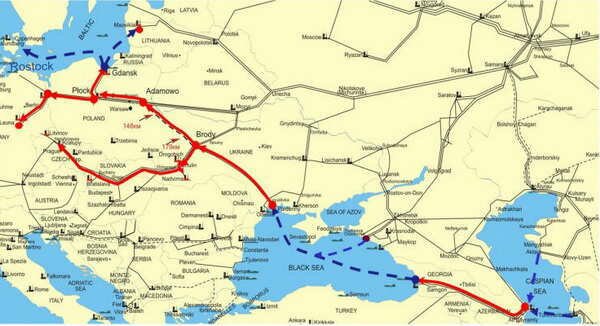
Creation of the BBSU can give a new impetus to the development of transnational energy projects in the area between the Baltic, Black and Caspian Seas. As you know, the idea of creation on the basis of the Ukrainian Odesa-Brody pipeline of the Euro-Asian Oil Transport Corridor (EAOTC), with its extension to Gdansk, originated in the early 1990s, but so far has not found the necessary funding for its implementation.
Poland is ready to finish its construction from Brody to Gdansk if it is guaranteed delivery of the needed volumes of Caspian oil. However, so far there are no guarantees. Some experts believe that the main reason for the lack of progress in the implementation of the project of the Odesa-Brody-Plotsk-Gdansk oil pipeline is the Russian authorities' blocking the access of competitive Caspian oil to the European market.
Having signed July 14, 2015 in Vienna the “historic agreement” between Iran and the six leading countries of the world (UK, Germany, France, China, Russia and the United States) on termination of the development of a nuclear weapons program, Iran in exchange for the gradual lifting of international sanctions was given an opportunity to significantly increase the export of its energy resources, in particular, into Europe. Lifting of sanctions against Iran opens up new prospects for Ukrainian-Iranian cooperation in the energy sector. This will allow to return to the idea of building the Iran-Europe transcontinental gas pipeline through the territory of Ukraine. According to the calculations of Derzhnaftogazprom and Ukrimpeks JSC, in 1990s there were determined a few projects of construction of gas transportation corridors Iran-Ukraine-Europe. The route Iran-Armenia-Georgia-Black Sea —Ukraine-Poland was considered the most promising.
To be continued…

